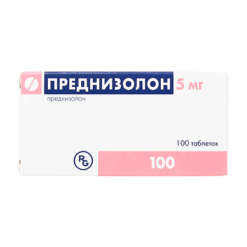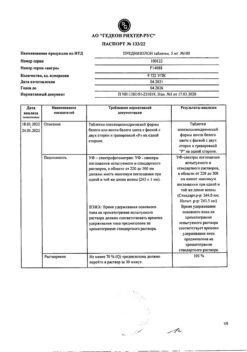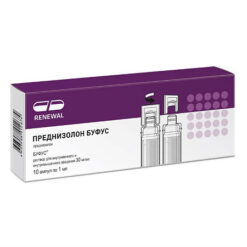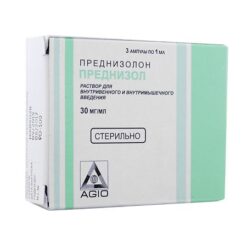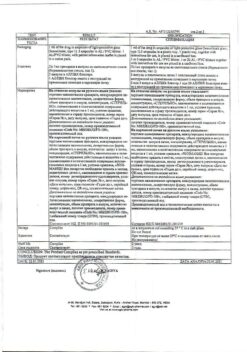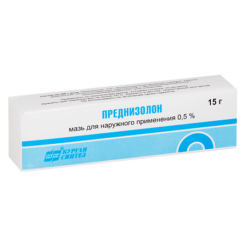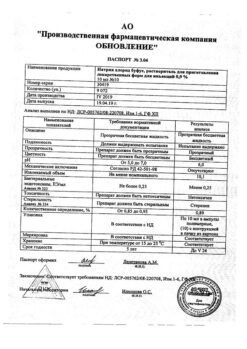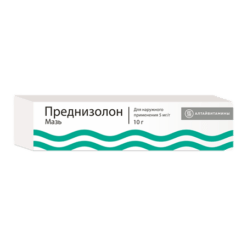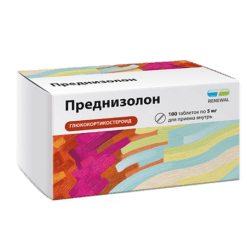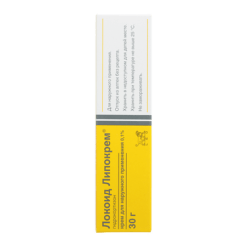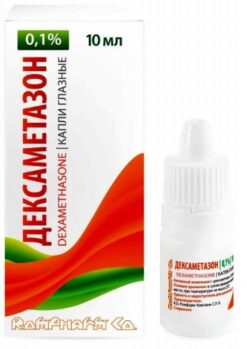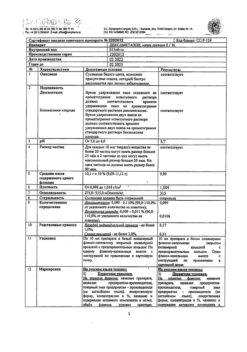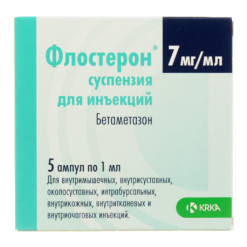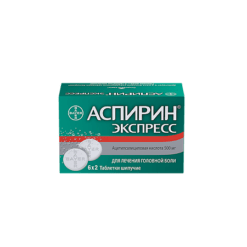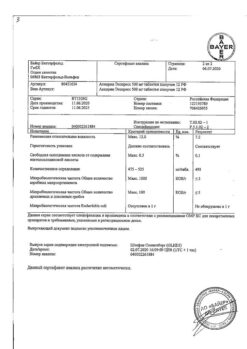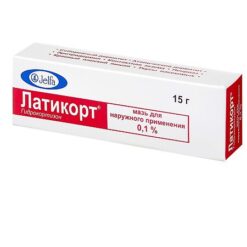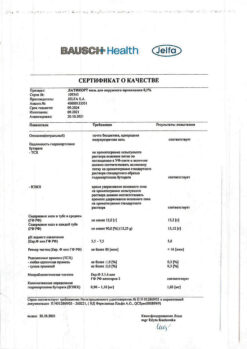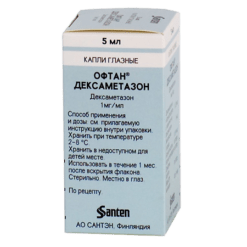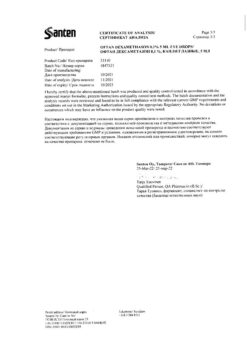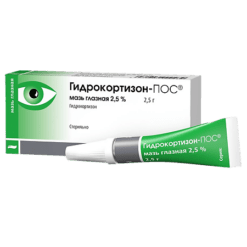No products in the cart.
Prednisolone, tablets 5 mg 100 pcs
€1.00
Out of stock
(E-mail when Stock is available)
Description
Prednisolone is a synthetic glucocorticoid drug. It has anti-inflammatory, anti-allergic, immunosuppressive, antiexsudative and antipruritic effects.
Indications
Indications
Active ingredient
Active ingredient
Composition
Composition
One tablet contains:
Active substance:
Prednisolone – 5 mg.
Excipients:
colloidal silicon dioxide;
potato starch:
stearic acid;
magnesium stearate;
talc;
povidone;
corn starch;
lactose monohydrate.
How to take, the dosage
How to take, the dosage
Overly, it is recommended to take once a day, in the morning; if necessary, more frequent administration is possible. The dose is set individually depending on the indications, therapy efficacy and patient’s condition. After achieving therapeutic effect, it is recommended to gradually reduce the dose to the minimum effective.
The average recommended dosage is 5-60 mg per day in adults, the maximum daily dose is 200 mg. In multiple sclerosis in the period of exacerbation – 200 mg per day for 7 days, then 80 mg per day for 1 month.
In children – 0.14-2 mg/kg per day in 3-4 doses.
If a dose is missed, the drug should be taken as soon as possible, but if the next dose is approaching, the missed dose should not be taken. A double dose should not be taken.
Interaction
Interaction
Heart glycosides: increased risk of cardiac rhythm disturbances and glycoside toxicity associated with hypokalemia.
Barbiturates, antiepileptic drugs (phenytoin, carbamazepine), rifampicin, glutethimide accelerate the metabolism of GCS (through induction of microsomal enzymes), weaken their effects.
The antihistamines weaken the effects of prednisolone.
Amphotericin B, carbohydrase inhibitors: hypokalemia, left ventricular myocardial hypertrophy, circulatory failure.
Paracetamol: hypernatremia, peripheral edema, increased calcium excretion, risk of hypocalcemia and osteoporosis. Increased risk of hepatotoxicity of paracetamol.
Anabolic steroids, androgens: increased risk of peripheral edema, acne; use with caution, especially in liver and heart disease.
Estrogen-containing oral contraceptives: increased concentration of glucocorticosteroid-binding globulins in serum, slower metabolism, increased T1/2, increased effect of prednisolone.
Choline-blocking drugs (mainly atropine) – increase in intraocular pressure.
Anticoagulants (coumarin derivatives, indandion, heparin), streptokinase, urokinase:decreased, and in some patients increased effectiveness; dose should be determined based on SP; increased risk of ulceration and bleeding from the GI tract.
Tricyclic antidepressants may exacerbate psychiatric disorders associated with prednisolone administration. They should not be prescribed to treat these disorders.
The oral antidiabetic drugs, insulin: attenuation of hypoglycemic effect, increase in blood glucose concentration. Correction of the dose of antidiabetic drugs is possible.
Antithyroid drugs, thyroid hormones – changes in thyroid function (dose adjustment of these drugs or discontinuation of their use is possible).
Diuretics: weakening of the action of diuretics (potassium-saving), hypokalemia.
Laxatives: weakening of action, hypokalemia.
Ephedrine may accelerate the metabolism of GCS (correction of prednisolone dose is possible).
Immunosuppressive drugs: increased risk of infection, lymphoma and other lymphoproliferative diseases.
Isoniazid: decrease in plasma concentration of isoniazid, mainly in persons with rapid acetylation (possible change in dose).
Mexiletine: acceleration of metabolism of mexiletine and reduction of its concentration in blood serum.
Drugs that block neuromuscular conduction (depolarizing myorelaxants): hypocalcemia associated with the use of prednisolone may increase synaptic blockade, leading to increased duration of neuromuscular blockade.
NSAIDs, acetylsalicylic acid, alcohol: weakening of action, increased risk of peptic ulcer disease and bleeding from the gastrointestinal tract.
Drugs and food containing sodium: peripheral edema, arterial hypertension (it may be necessary to reduce sodium intake with food and medications with high sodium content; sometimes use of GCS requires additional sodium administration).
Vaccines containing live viruses: while using immunosuppressive doses of GCS, viral replication and viral disease may occur; decreased antibody production (concomitant use is not recommended).
Other vaccines: increased risk of neurological complications and decreased antibody production.
Folic acid: increased need for this drug.
Special Instructions
Special Instructions
Prednisolone is contraindicated in patients with systemic fungal infections because of the risk of increased infection. The drug may in some cases be used in fungal infections treated with amphotericin B to reduce its side effects, but in these cases it may cause circulatory failure and left ventricular myocardial hypertrophy and severe hypokalemia. Taking the drug with food may reduce gastrointestinal side effects.
The effectiveness of antacid drugs in preventing ulcer formation, bleeding from the digestive tract or intestinal perforation has not been confirmed. With long-term treatment, it may be necessary to limit sodium and increase potassium, and to increase protein in the diet.
If steroid myopathy develops, if therapy with prednisolone cannot be reversed, replacement with another GCS may alleviate the symptoms.
The risk of osteoporosis with prolonged use of GCS may be reduced by taking calcium and vitamin D or by exercise if the patient’s condition allows.
If psychosis or depression occurs, the dose should be reduced if possible, or the drug should be stopped. Phenothiazines or lithium compounds may be used if necessary.
Acetylsalicylic acid or other NSAIDs can be prescribed to alleviate some of the symptoms of GCS withdrawal (without suppressing the hypothalamic-pituitary-adrenal system).
Side effects
Side effects
In short-term use of prednisolone, like other GCSs, side effects are rare. When using prednisolone for a long time, the following side effects may develop:
Water-electrolyte metabolism disorders: sodium and fluid retention in the body, hypokalemia, hypokalemic alkalosis.
Cardiovascular system disorders: increase in BP, circulatory failure.
Musculoskeletal system disorders: muscle weakness, steroid myopathy, loss of muscle mass, osteoporosis, spinal compression fracture, aseptic necrosis of femoral and humeral heads, pathological fractures of long bones.
Gastrointestinal organs: steroid ulcer with possible perforation and bleeding, pancreatitis, flatulence, ulcerative esophagitis, digestive disorders, nausea, increased appetite.
Skin disorders: atrophic streaks, acne, delayed wound healing, skin thinning, petechiae and bruises, erythema, increased sweating, allergic dermatitis, urticaria, angioedema.
Nervous system and sensory organs: Increased intracranial pressure with optic nerve congestion syndrome (pseudotumor of the brain – more common in children, usually after reducing the dose too quickly, symptoms are headache, worsened visual acuity or double vision); seizures, dizziness, headache, sleep disturbance, posterior subcapsular cataracts, increased intraocular pressure, glaucoma; exophthalmus.
Endocrine status: Secondary adrenal and hypothalamic-pituitary insufficiency (especially during stressful situations such as illness, trauma, surgery); Cushing’s syndrome; growth suppression in children; menstrual disorders; decreased carbohydrate tolerance; manifestation of latent diabetes and increased need for insulin or oral antidiabetic drugs in diabetic patients, hirsutism.
Metabolic side: negative nitrogen balance as a result of protein catabolism, hyperglycemia, glucosuria.
Mental disorders: symptoms mimicking schizophrenia, mania or delirium syndrome (most often appear during the first two weeks of treatment). Women and lupus erythematosus patients are most susceptible to mental disorders.
Others: anaphylactic and hypersensitivity reactions, obliterating endarteritis, weight gain, masking of symptoms of infectious diseases, fainting.
Overdose
Overdose
The risk of overdose is increased with long-term use of prednisolone, especially in high doses.
Symptoms: increased BP, peripheral edema, increased adverse effects described above.
Treatment: The drug should be temporarily discontinued or the dose should be reduced.
Similarities
Similarities
Additional information
| Manufacturer | Simpex Pharma Pvt. Ltd. |
|---|---|
| Medication form | pills |
| Brand | #Н/Д |
Other forms…
Related products
Buy Prednisolone, tablets 5 mg 100 pcs with delivery to USA, UK, Europe and over 120 other countries.


